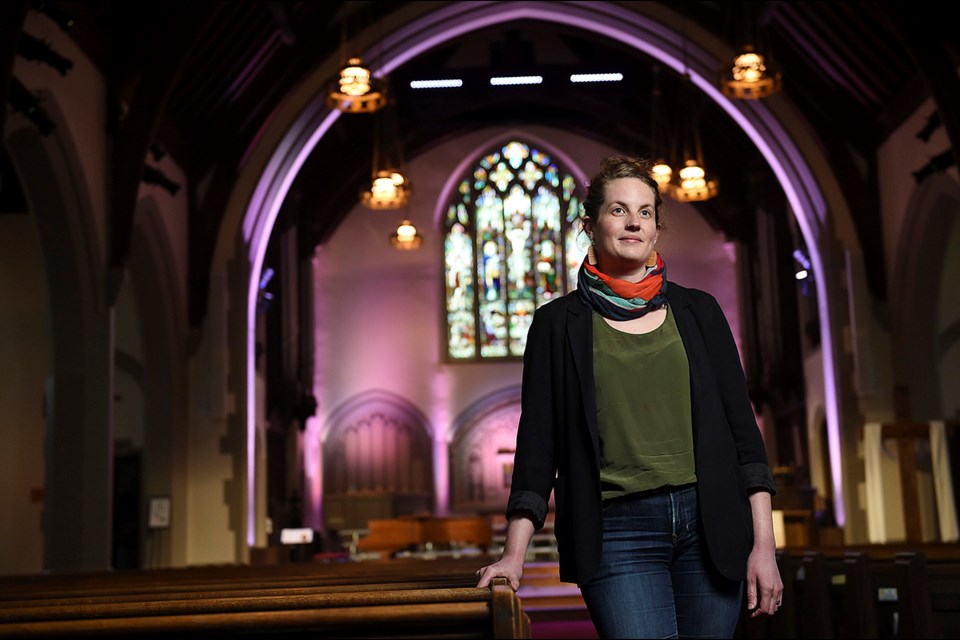Faith is not just a calling for Christine Boyle and Natalie Maxson. It’s a call to action.
For Boyle it’s what compelled her to be a delegate at the Paris climate talks and, as co-founder of Fossil Free Faith, convince the United Church to divest itself of any stocks in carbon-producing companies. It’s what made her join the Women’s March to let Donald Trump know that women’s rights were sacrosanct and, in autumn 2016, be part of the Pope’s release of Laudato Si, a ground-breaking encyclical which says destroying the environment is a sin.
For Maxson, action is what gives shape and purpose to her understanding of the words of Jesus Christ which guide her peace-based quest to oppose injustice around the world.
On April 28 and 29, the two women will be at St. Andrew’s Wesley to take part in a conference called Inspire — Passion for Justice and Ministry in Your Community.
The conference is designed as “an ecumenical forum rooted in spirituality that will connect you with others yearning for social change and progressive family ministry.”
In today’s world it can seem that the “religious right” has hijacked the faith-and-activism message. When religion is mentioned in politics it is often used to deny rights to women and members of the LGBTQ community. Coupled with the history of many churches to hide or deny physical and sexual abuse among their leaders, the concept of faith has been tarnished for many people.
Both Boyle and Maxson are in their thirties; both are young mothers and both are trying to change the conversation around faith in a secular society.
“Theologically, in a lot of Canadian churches we’re focused on Christ as servant rather than Christ the Almighty King, and that makes a difference in how we view faith,” says Boyle, who will be ordained as a United Church minister next month. Canadian churches seem more willing to confront historical atrocities and want to atone for them. That quest for atonement creates a humility that infuses the theology."
She grew up in an active United Church congregation that fostered youth involvement. "Most of the people I saw doing the work were doing it
Maxson understands what compels religious right. “There’s something seductive about feeling right. That kind of theology doesn’t look at the nuances. It’s black and white, yes or no, and if I’m on one side of the line I’m right. That kind of being and thinking is satisfying and seductive. It’s easier to think ‘My faith is right.’”
When Boyle got her master’s degree at the Graduate Theological Union in Berkeley, California, “I saw a lot of both approaches, [including] lots of the self-righteousness that you hear so many activists rallying against and being disappointed about.”
Why disappointment? “Because of the hypocrisy, the gap between what is said to be important and what is lived out.”
Her goal is to personify “a different definition of how faith can inspire us to act so people can see another example of what faith looks like. We can challenge the way the religious right interprets scripture so [the right] doesn’t have full theological reign. We can reclaim some of that language and the stories….
“There’s hope that scriptures and values should work for a world that works better.”
Like Boyle, Maxson grew up in the United Church. She doesn’t mind the liturgy but when she goes to church, she finds the message can almost be too scripted. “I’m at home in the church environment but it’s not where I go for nourishment. It can be a lot of words and gestures. Sometimes I’m craving silence and nature and a deep heartfelt conversation. I’m drawn to work that engages my faith. It’s not static.”
Maxson, whose partner was raised Muslim, is inspired by the teachings of Christ — “non-violence, transformation and healing, justice and turning power upside down. For me, looking at the way Christ lived and what he did was very radical and really unexpected. And it’s no-holds-barred and done with a lot of love.”
During her undergrad studies, she had a Jewish professor who was a peace activist and led a local chapter of Women in Black, “a world-wide network of women committed to peace with justice and actively opposed to injustice, war, militarism and other forms of violence.”
Maxson also got involved with Christian Peacemakers, an ecumenical movement which believes “we can transform war and occupation, our own lives and the wider Christian world through the non-violent power of God’s truth, partnerships with local peacemakers and bold action.”
She spent months in the Middle East, which will be the basis of her talk at the conference. In Palestine, Christian Peacemaker teams work with local Palestinian and Israeli peacemakers “to help create a space for justice and peace.”
She’s also the project support co-ordinator for CP’s Indigenous Peoples Solidarity Project in North America/Turtle Island.
The issues she deals with are complex and nuanced which lead to a natural cautiousness when broaching the subject. “It’s very delicate,” she says. “You really have to dig deep and make a safe space where people can think things through and hear one another.”
The conference plans to provide that safe space.



